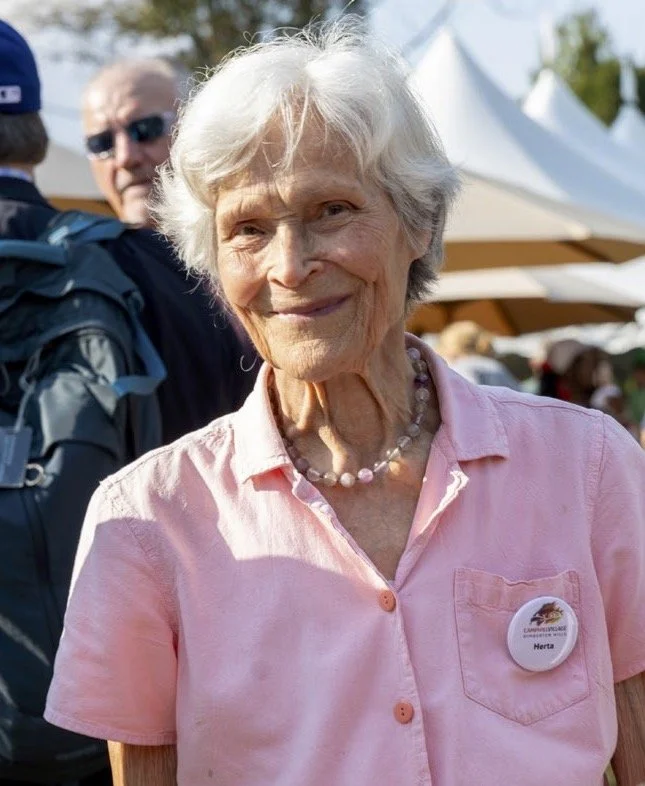Recognizing Herta Hoy
Herta grew up in a musical family in East Germany and at the age of 16 began her studies at Loheland, an anthroposophically inspired school “run by mighty women” which specialized in movement and music. She remembers being moved by the festivals there, and especially by a song composed for a verse by Rudolf Steiner. Her whole soul resonated with the words, which called her to serve the true image of the human being.
Although she could have stayed at Loheland and become a teacher, at 21 she wanted to see the world and travelled with a schoolmate to take a job in Wales. Soon longing for more meaningful work, someone suggested that she look into Camphill. The address said Camphill Rudolf Steiner School, and because she knew and trusted the name Rudolf Steiner, she put her belongings together, with her guitar slung over her back, and hitch-hiked to Karl König’s house in Scotland. There, she was given the task of caring for the blind children, who shared her love for music.
After a time, Herta went to Dr. König and asked to take the training course. He suggested that she could join the second-year group because of her previous studies at Loheland. But she wanted to start at the beginning, which meant moving from Scotland to the Shieling School in England, which is where she met Andrew. For the second year of training, she moved back to Scotland to work with the blind children again. And in her third year she moved to Newton Dee to live with Friedwart and Nora Bock.
Meanwhile, Andrew went to America to join a group of older coworkers who took over the Downingtown Special School, which had been founded by Gladys and Bill Hahn but was turned over to Camphill when Bill had a stroke. In 1961, Janet MacGavin visited from America and invited Herta to join them in Pennsylvania, saying, “Andrew needs you.” This felt right to her, and so she crossed the Atlantic. In May of 1962 she and Andrew married, and they lived in the large house at Donegal Springs, which offered much better accommodation for the school, and this is where their first two children, Sebastian and Francis were born.
In 1967, they moved to Beaver Run, and for the first time Herta had a house of her own in Rock Crystal. There, Christian and Armigh joined the family.
I still remember being a young coworker in Beaver Run, having decided to leave, and shedding tears in the Sunday Service at the thought of never being able to hear Herta’s beautiful singing voice again. Little did I know that destiny would bring us together six years later in Kimberton Hills, and I would have the privilege of hearing her sing regularly for over 50 years!
Although music and storytelling were her strong gifts, Herta’s focus was in the home. In 1970, the family moved to Garden House, where she cared for seven students plus her own four children. When Kimberton Hills was given to Camphill in November of 1972, it was kept a secret until the last minute. Herta recalls Andrew showing her the property and asking if she would be willing to relocate to start a new adult Village—two days before they moved! Suddenly, she had a huge mansion to look after. Rosie was born there, and they stayed in Kepler House for the next 14 years. From its inception, Herta impressed upon this new community her ethics of hard work and frugality. And she was a model of modesty, not calling attention to her achievements, although she could become passionate and strong-minded about what she believed to be right. Over time, this soul quality has softened as she became more flexible and open—and in her later years it is clear that her life experience has deepened into great wisdom.
Herta embraced the biodynamic impulse by supporting land workers and taking responsibility for making the Dandelion Preparation. In the early years, she took on being the Village baker, and she was in charge of food processing when the garden produced mountains of fruit and vegetables that needed to be preserved and frozen for winter. She seamlessly adjusted to the work of social therapy, taking on the most challenging people, forming lasting, devoted friendships with the people she lived with, and also with their families.
In 1986, she and Andrew separated, and Herta moved to Martin’s House when it was newly built. There she took on seven Villagers. She was always a doer, who taught by example. Yet those who knew her knew that she was (and remains) also an avid reader and student of anthroposophy, who liked to share what she was learning.
Herta carried the musical element in the community and led the choir, but her focus remained homemaking until, at the age of 72 in 2007, she passed Martin’s House on to others and moved back to a smaller space in Kepler House. In the ensuing years, she could still be seen taking care of the gardens around Kepler, Rose Hall, and the Community Health Center, weeding, clipping, hauling wheelbarrows of brush, and building fires.
As Herta herself explains, "Throughout my life, music, movement, storytelling, and acting have highlighted and fed my soul. Love has been a thread that has carried me through my life here at Camphill Village Kimberton Hills, and I am grateful."
By Sherry Wildfeuer


